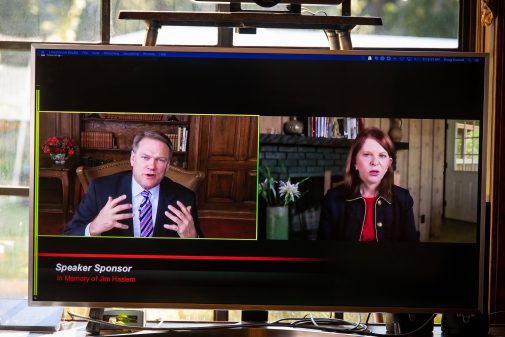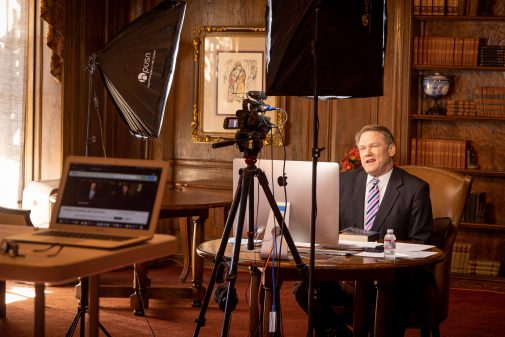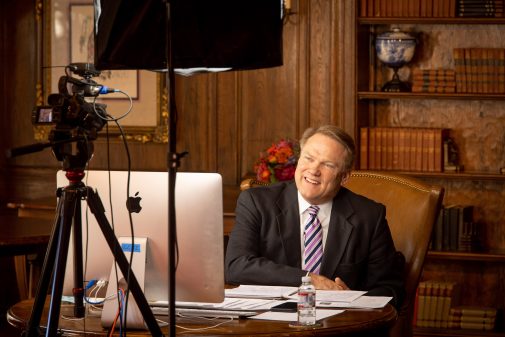Westmont News
Crisis Leadership Event Attracts Large Audience

By
Westmont
Nancy Koehn, Harvard historian and bestselling author of “Forged in Crisis: The Power of Courageous Leadership in Turbulent Times,” expounded on lessons from five masters of crisis at the 16th annual Westmont President’s Breakfast, held virtually March 5. Nearly 2,000 participants registered for the online event.
The President's Breakfast will be rebroadcast on KEYT-TV on Sunday, March 21, from 4-5 p.m.
Westmont President Gayle D. Beebe gave the Westmont Leadership Award to Koehn for “highlighting principled courageous leaders who led effectively in the face of crises.”
“I will treasure it for the rest of my life,” she said. “My thanks to all of the Westmont community for this honor, a real highpoint for me.”
Koehn has focused her research on crisis leadership and how leaders and their teams rise to the challenges of high-stakes situations. She began the Q&A with Beebe by examining the steely determination of Ernest Shackleton, an Antarctic explorer whose ship became locked in the ice in 1915, endangering him and his 27 men.

With no radio, text messaging or way to communicate with anyone, the mission of crossing the Antarctic continent quickly changed. For 19 months, while the men lived on the ice, Shackleton made a number of critical decisions to get them home safely.
“They could not have done it, not any small part of it, without the determination, resources, courage, resilience and sense of purpose of Ernest Shackleton,” Koehn said. “And in all kinds of moments along the way, it’s his ability to grab deep within himself and say, I must improvise, I must be brave. Over and over (it’s) that steely determination which really makes the impossible possible in this situation.”
That theme, she said, is not only powerful for our time of living during a pandemic, but one that also runs through stories of Abraham Lincoln, Fredrick Douglass, Dietrich Bonhoeffer and Rachel Carson, characters she highlights in her “Forged in Crisis” book.
“In each of these stories there are these moments, this concatenation of circumstances, that when everything depends on the leader not falling over the cliff of doubt, holding on to the mission and taking the next step forward toward that mission — and here is the really interesting thing — other people following that leader, realizing they will follow, (where) the line is held and the mission can continue,” she said.
 Lincoln, she says, inherited circumstances that he didn’t create, yet he never blamed anyone before him for his problems. “His ability to experience negative emotions without falling through the floorboards of doubt is a vital lesson for today’s leaders,” she said.
Lincoln, she says, inherited circumstances that he didn’t create, yet he never blamed anyone before him for his problems. “His ability to experience negative emotions without falling through the floorboards of doubt is a vital lesson for today’s leaders,” she said.
Lincoln, she says, had the ability to focus on his role, detach himself from the immediate to survey the larger picture, communicate to many constituencies, and empathize with others.
“You put all those things together, stir them up and heat for half an hour in an oven at 350 degrees and you get the Gettysburg Address,” she says, “which in 274 words is like a Butterick pattern of: Who are we? Where did we come from? What is the crisis for which we’ve arrived? What is being struggled for here? How is the crisis unfolding? What are the tradeoffs? Why are they worth making? What is my job? And why must we continue the fight?”
Describing Lincoln and Douglass, Koehn says the two are at opposite ends of a bookshelf on the transformation of America to end slavery following the Civil War. “It wouldn’t have been possible without either man,” she says. “Douglass begins an extraordinary single, individual effort to start building abolitionist sentiment and the abolitionist cause.”
A brilliant, courageous orator with a strong charisma, Douglass rose in popularity as his access to journalists and politicians increased. “All of that effort is putting coins in the bank of popular sentiment, and that is what Lincoln must have to start writing the Emancipation Proclamation,” she said.
Dietrich Bonhoeffer, the Lutheran minister who was hanged by the Nazis near the end of World War II, believed that love and non-violence were the most important of Christ’s teachings. “So for him to start as a theologian and minister to actively join a plot inside the Nazi government to assassinate Hitler tells you something about the journey traveled within himself,” Koehn said. “But here’s the most important thing, to be absolutely candid about the moral tradeoffs of taking the life of another person, even if that person was one of the evilest people that history has ever known. Morally serious, morally honest and always unafraid to look at what we are doing from the perspective of is it right and is it true.”
Environmental crusader Rachel Carson, who earned a master’s in zoology at Johns Hopkins University, began an ambitious career seeking to be a bestselling author and well known scientist. However, for a decade, she was unable to progress professionally, due to numerous health setbacks and family challenges. She was left to invest instead in herself, her mind and growing intellectually and emotionally while dealing with an onslaught of personal, family crises. “There are many years, periods, seasons in our life where we are not checking anything off of the bucket list,” Koehn says. “But if we open ourselves and learn from this, even if I can’t post it to Facebook, there is something important happening. We are gathering the stuff in ourselves we will need when we walk toward a much different kind of moment and either discover our mission or find a way to realize it. Then we’ll draw on all those investments, just like dividends, in that moment. So our willingness to be comfortable with gathering seasons is important, especially in our white-hot, narcissistically driven, social-media-determined time right now.”

In support of March as National Women’s History Month, Westmont used Nancy Koehn’s talk to kick off the month’s focused activities on Lead with Action, Advancing Women in Leadership as host to the sixth annual Advancing Women in Leadership (AWiL) virtual conference in partnership with the Council for Christian Colleges and Universities (CCCU). National discussions including talks on inclusive leadership in action, features CCCU’s Dr. Kimberly Battle-Walters Denu as the moderator of a panel of chief diversity officers serving in CCCU colleges and universities on March 26. The virtual event is by invitation only and made available at no cost to higher education professionals and students thanks to the generosity of Westmont’s Women’s Leadership Council. For more information, go to AWiL2021 on Westmont’s website.
Filed under
Academics, Alumni, Campus Events, Campus News, Faculty and Staff, Featured, Giving, Lectures, Press Releases